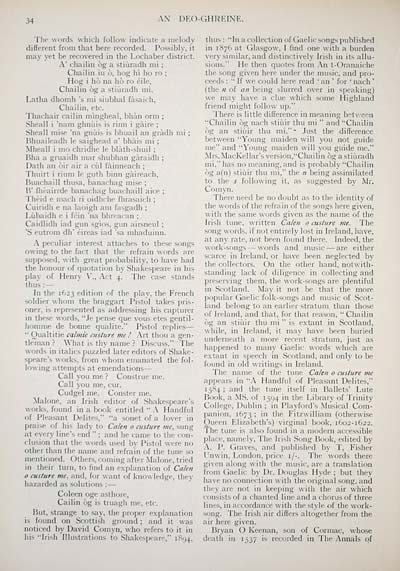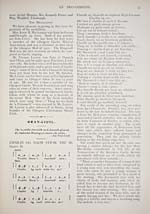Blair Collection > Deo-gréine
(50)
Download files
Complete book:
Individual page:
Thumbnail gallery: Grid view | List view

34
AN DEO-GHREIN]
The words winch follow indicate a melody
different from that here recorded. Possibly, it
may yet be recovered in the Lochaber district.
A' chailin òg a stiùradh mi ;
Chailin in ò, hog hi ho ro ;
I log i hò na hò ro èile,
Chailin òg a stiuradh mi.
Latha dhomh V mi siubhal fàsaich,
Chailin. etc.
Thachair cailin mìngheal, bhàn orm ;
Sheall i 'nam ghnùis is rinn i gàire :
Sheall mise "na gnùis is bhuail an gràdh mi ;
Bhuaileadh le saighead a' bhàis mi ;
Mheall i mo chridhe le blàth-shuil ;
Bha a gruaidh mar shubhan gàraidh ;
Dath an òir air a cùl fàinneach ;
Thuirt i rium le guth binn gàireach,
Buachaill thusa, banachag mise ;
IV fhèairrde banachag buachaill aice ;
Thèid e mach ri oidhche fhrasaich ;
Cuiridh e na laoigh am fasgadh ;
Lùbaidh e i fèin 'na bhreacan ;
Caidlidh iad gun sgios, gun airsneul ;
'S eutrom dh' (areas iad 'sa mhaduinn.
A peculiar interest attaches to these songs
owing to the fact that the refrain words are
supposed, with great probability, to have had
the honour of quotation by Shakespeare in his
play of Henry V., Act 4. The case stands
thus : —
In the 1623 edition of the play, the French
soldier whom the braggart Pistol takes pris-
oner, is represented as addressing his capturer
in these weirds, "Je pense que vous etes gentil-
homme de bonne qualite." Pistol replies —
" Oualtitie calmie custure me ! Art thou a gen-
tlemaa ? What is thy name ? Discuss." The
words in italics puzzled later editors of Shake-
speare's works, from whom emanated the fol-
lowing attempts at emendations —
Call you me? Construe me.
Call you me, cur.
Cudgel me. Conster me.
Malone, an Irish editor of Shakespeare's
works, found in a book entitled " A Handful
of Pleasant Delites," "a sonet of a lover in
praise of his lady to Calen o custure me, sung
at every line's end " : and he came to the con-
clusion that the words used by I'isto] were no
othei than the name and refrain of the tune so
mentioned. Others, coming after Malone, b ied
in their turn, to find an explanation of Calen
custure me, and, for want of knowledge, they
hazarded as solutions : —
Coleen oge asthore,
Cailin og is truagh me, etc.
But, strange to saw the proper explanation
is found on Scottish ground ; and it was
noticed by David Comyn, who refers to it in
his "Irish Illustrations to Shakespeare," 1894,
thus : "In a collection of Gaelic songs published
in 1876 at Glasgow, I find one with a burden
very similar, and distinctively Irish in its allu-
sions." I le then quotes from An t-Oranaiche
the song given here under the music, and pro-
ceeds : "If we o tuld here read ' an ' for ' nach '
(the ;/ of an being slurred over in speaking)
we may have a clue which some Highland
friend might follow up."
There is little difference in meaning between
"Chailin òg nach stiùir thu mi " and "Chailin
og an stiuir thu mi."- Just the difference
between "Young maiden will you not guide
me" and "Young maiden will you guide me."
M rs. MacKellar's version, "Chailin òg a stiùradh
mi," has no meaning, and is probably "Chailin
òg a(n) stiùir thu mi," the ;/ being assimilated
to the s following it, as suggested by Mr.
Comyn.
There need be no doubt as to the identity of
the words of the refrain of the songs here given,
with the same words given as the name of the
Irish tune, written Calen custure me. The
song words, if not entirely lost in Ireland, have,
at any rate, not been found there. Indeed, the
work-songs — words and music — are either
scarce in Ireland, or have been neglected by
the collectors. On the other hand, notwith-
standing lack of diligence in collecting and
preserving them, the work-songs are plentiful
in Scotland. May it not be that the more,
popular Gaelic foìk-songs and music of Scot-
land belong to an earlier stratum than those
of Ireland, and that, for that reason, "Chailin
òg an stiùir thu mi " is extant in Scotland,
while, in Ireland, it may have been buried
underneath a more recent stratum, just as
happened to many Gaelic words which are
extant in speech in Scotland, and only to be
found in old writings in Ireland.
The name of the tune Calen custure me
appears in "A Handful of Pleasant Delites,"
1584 ; and the tune itself in Pallets' Lute
Book, a MS. of 1594 in the Library of Trinity
College, Dublin; in Playford's Musical Com-
panion, [673; in the Fitzwilliam (otherwise
Queen Elizabeth's) virginal book, 1(102-1622.
The tune is also found in a modern accessible
place, namely, The Irish Song Book, edited by
A. P. Graves, and published by T. Fisher
Unwin, London, price 1/-. The words there
given along with the music, are a translation
1 1 Gaelic by Dr. Douglas Hyde; but they
have no connection with the original song, and
they are not in keeping with the air which
consists of a chanted line and a chorus of three
lines, in accordance with the style of the work-
song. The Irish air differs altogether from the
air here given.
Bryan Keenan, son of Cormac, whose
death in 1537 is recorded in The Annals of
AN DEO-GHREIN]
The words winch follow indicate a melody
different from that here recorded. Possibly, it
may yet be recovered in the Lochaber district.
A' chailin òg a stiùradh mi ;
Chailin in ò, hog hi ho ro ;
I log i hò na hò ro èile,
Chailin òg a stiuradh mi.
Latha dhomh V mi siubhal fàsaich,
Chailin. etc.
Thachair cailin mìngheal, bhàn orm ;
Sheall i 'nam ghnùis is rinn i gàire :
Sheall mise "na gnùis is bhuail an gràdh mi ;
Bhuaileadh le saighead a' bhàis mi ;
Mheall i mo chridhe le blàth-shuil ;
Bha a gruaidh mar shubhan gàraidh ;
Dath an òir air a cùl fàinneach ;
Thuirt i rium le guth binn gàireach,
Buachaill thusa, banachag mise ;
IV fhèairrde banachag buachaill aice ;
Thèid e mach ri oidhche fhrasaich ;
Cuiridh e na laoigh am fasgadh ;
Lùbaidh e i fèin 'na bhreacan ;
Caidlidh iad gun sgios, gun airsneul ;
'S eutrom dh' (areas iad 'sa mhaduinn.
A peculiar interest attaches to these songs
owing to the fact that the refrain words are
supposed, with great probability, to have had
the honour of quotation by Shakespeare in his
play of Henry V., Act 4. The case stands
thus : —
In the 1623 edition of the play, the French
soldier whom the braggart Pistol takes pris-
oner, is represented as addressing his capturer
in these weirds, "Je pense que vous etes gentil-
homme de bonne qualite." Pistol replies —
" Oualtitie calmie custure me ! Art thou a gen-
tlemaa ? What is thy name ? Discuss." The
words in italics puzzled later editors of Shake-
speare's works, from whom emanated the fol-
lowing attempts at emendations —
Call you me? Construe me.
Call you me, cur.
Cudgel me. Conster me.
Malone, an Irish editor of Shakespeare's
works, found in a book entitled " A Handful
of Pleasant Delites," "a sonet of a lover in
praise of his lady to Calen o custure me, sung
at every line's end " : and he came to the con-
clusion that the words used by I'isto] were no
othei than the name and refrain of the tune so
mentioned. Others, coming after Malone, b ied
in their turn, to find an explanation of Calen
custure me, and, for want of knowledge, they
hazarded as solutions : —
Coleen oge asthore,
Cailin og is truagh me, etc.
But, strange to saw the proper explanation
is found on Scottish ground ; and it was
noticed by David Comyn, who refers to it in
his "Irish Illustrations to Shakespeare," 1894,
thus : "In a collection of Gaelic songs published
in 1876 at Glasgow, I find one with a burden
very similar, and distinctively Irish in its allu-
sions." I le then quotes from An t-Oranaiche
the song given here under the music, and pro-
ceeds : "If we o tuld here read ' an ' for ' nach '
(the ;/ of an being slurred over in speaking)
we may have a clue which some Highland
friend might follow up."
There is little difference in meaning between
"Chailin òg nach stiùir thu mi " and "Chailin
og an stiuir thu mi."- Just the difference
between "Young maiden will you not guide
me" and "Young maiden will you guide me."
M rs. MacKellar's version, "Chailin òg a stiùradh
mi," has no meaning, and is probably "Chailin
òg a(n) stiùir thu mi," the ;/ being assimilated
to the s following it, as suggested by Mr.
Comyn.
There need be no doubt as to the identity of
the words of the refrain of the songs here given,
with the same words given as the name of the
Irish tune, written Calen custure me. The
song words, if not entirely lost in Ireland, have,
at any rate, not been found there. Indeed, the
work-songs — words and music — are either
scarce in Ireland, or have been neglected by
the collectors. On the other hand, notwith-
standing lack of diligence in collecting and
preserving them, the work-songs are plentiful
in Scotland. May it not be that the more,
popular Gaelic foìk-songs and music of Scot-
land belong to an earlier stratum than those
of Ireland, and that, for that reason, "Chailin
òg an stiùir thu mi " is extant in Scotland,
while, in Ireland, it may have been buried
underneath a more recent stratum, just as
happened to many Gaelic words which are
extant in speech in Scotland, and only to be
found in old writings in Ireland.
The name of the tune Calen custure me
appears in "A Handful of Pleasant Delites,"
1584 ; and the tune itself in Pallets' Lute
Book, a MS. of 1594 in the Library of Trinity
College, Dublin; in Playford's Musical Com-
panion, [673; in the Fitzwilliam (otherwise
Queen Elizabeth's) virginal book, 1(102-1622.
The tune is also found in a modern accessible
place, namely, The Irish Song Book, edited by
A. P. Graves, and published by T. Fisher
Unwin, London, price 1/-. The words there
given along with the music, are a translation
1 1 Gaelic by Dr. Douglas Hyde; but they
have no connection with the original song, and
they are not in keeping with the air which
consists of a chanted line and a chorus of three
lines, in accordance with the style of the work-
song. The Irish air differs altogether from the
air here given.
Bryan Keenan, son of Cormac, whose
death in 1537 is recorded in The Annals of
Set display mode to: Large image | Transcription
Images and transcriptions on this page, including medium image downloads, may be used under the Creative Commons Attribution 4.0 International Licence unless otherwise stated. ![]()
| Early Gaelic Book Collections > Blair Collection > Deo-gréine > (50) |
|---|
| Permanent URL | https://digital.nls.uk/76698243 |
|---|
| Description | A selection of books from a collection of more than 500 titles, mostly on religious and literary topics. Also includes some material dealing with other Celtic languages and societies. Collection created towards the end of the 19th century by Lady Evelyn Stewart Murray. |
|---|
| Description | Selected items from five 'Special and Named Printed Collections'. Includes books in Gaelic and other Celtic languages, works about the Gaels, their languages, literature, culture and history. |
|---|

